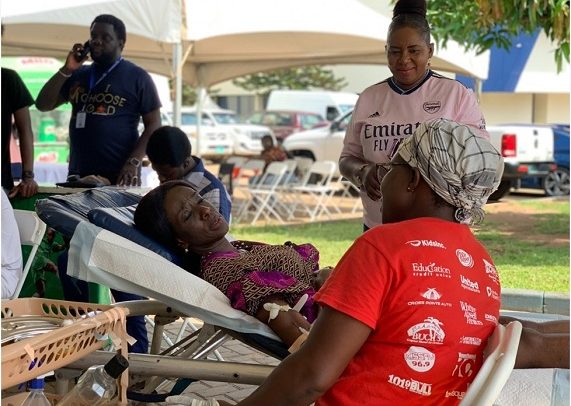Mrs. Delese Darko going through the blood donation process
Two documents aimed at strengthening the surveillance procedures covering the entire blood transfusion chain have been launched.
The National Haemovigilance Framework and the Guidelines for Haemovigilance in Ghana were launched by the National Blood Service (NBS) and the Food and Drugs Authority (FDA)with funding from the Paul Ehrlich Institute to further promote the safety of blood and blood products.
The Haemovigilance Framework outlines all the steps involved in the haemovigilance process, reporting adverse events and the roles and responsibilities of all relevant stakeholders, with an action plan to be completed.
The purpose of the guideline is to give direction to healthcare workers involved at the various stages of blood transfusion to standardise their activities, taking into account the country’s systems for managing blood as a biological medicinal product, which includes but not limited to its quality, safety and efficacy.
Minister of Health, Kwaku Agyeman-Manu, speaking at the launch, said whole blood and blood products are medical therapeutics that are critical in health care delivery through improving and saving millions of lives annually.
He indicated that the FDA, in collaboration with the NBS, has made huge strides in ensuring the development and implementation of a blood regulatory framework.
“The two agencies, over the years, have collaborated to develop regulatory guidelines for registering Plasma-Derived Medicinal Products (PDMPs), for licensing of blood facilities and the listing of blood and blood components, as well as guidelines for inspection and compliance monitoring of blood facilities,” he said.
Mr. Agyeman-Manu said the guidance documents are being implemented to ensure good quality, efficacious and safe blood and blood products are available to Ghanaians.
“The launch of the Haemovigilance Framework and Guidelines is the final stage to ensure the continuum of regulation to further strengthen the blood regulatory system, and to enable health workers at all levels to report safety issues to the FDA for appropriate regulatory action,” he added.
CEO of the FDA, Delese Mimi Darko, said haemovigilance is an integral part of quality management in the blood transfusion chain and is required for the continual improvement of the blood transfusion process.
“Haemovigilance systems provide valuable data on a range of adverse events related to blood donation and clinical blood transfusion, from donor syncopal events to transfusion-transmissible infections, immunological and non-immunological transfusion reactions, near-misses, and errors,” she said.
Mrs. Darko said the two documents would contribute to Ghana’s efforts towards becoming a WHO Listed Authority in the regulation of health products.
The launch was followed by a blood donation exercise at the FDA office.
By Jamila Akweley Okertchiri

